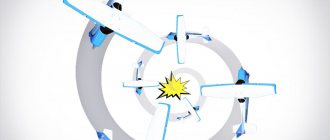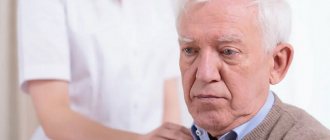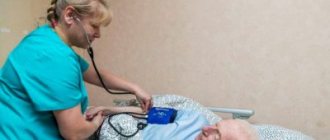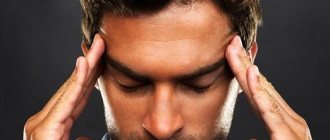The nature of amnesia in old age
In older years, a person’s brain functionality decreases, the process of cellular renewal slows down, and biochemical processes deteriorate. The body is aging.
Although memory loss in older people is a common problem, it is not a necessary consequence of aging. In a healthy elderly person, memory functions worse, but is generally normal, with minor defects. He analyzes and assimilates new information more slowly, remembers large amounts of data worse, and may forget the name of someone he knows.
Serious memory impairment is associated with the influence of external causes: head injuries, circulatory disorders, mental disorders, long-term use of drugs and others.
Memory deteriorates gradually. First, a person forgets the events of the present, then - details and details. Then the memory of the events of youth returns. Then the person forgets personal information and stops recognizing people.
Top 10 drugs for the brain and memory of older people
There are quite a lot of medications prescribed for older people to improve brain activity. The table lists the most common ones and also highlights their advantages and disadvantages.
| A drug | Description | pros | Minuses |
| Noopept | Noopept is a new generation nootropic drug, developed by domestic scientists. Helps improve blood circulation and brain function, restore memory and attention, reduce dizziness, improve well-being and normalize sleep. The composition of the drug has a unique complex effect: 1. Nootropic properties restore memory. Unlike similar drugs, Noopept directly affects all three stages of memory: I - memorization, II - storage, III - reproduction. 2. The antioxidant properties of Noopept build protection against the effects of free radicals. 3. The neuroprotective properties of the drug protect the brain cells of an elderly person and activate the cells’ own defense mechanisms. Under the influence of the active substance of the drug, the brain becomes more resistant to various damaging influences, and the degree of damage to neurons decreases. 4. The nootropic provides additional nutrition and blood supply to the brain, improves the rheological properties of the blood. | An innovative drug that demonstrates high efficiency. Promotes restoration of cognitive functions (improves attention, memory, learning ability). It also normalizes sleep and improves mood. The medicine has a minimal number of contraindications and side effects and is not addictive in older people. | Recommended course of treatment: 1.5–3 months. |
| Vinpocetine (Cavinton) | A medicine that corrects cerebral circulatory disorders. | Improves metabolism and cerebral blood flow, utilizes glucose. | Taking the medication often leads to a decrease in blood pressure, causing tachycardia and extrasystole. |
| Phenibut | A nootropic that has an anxiolytic, anticonvulsant, and antioxidant effect. | Reduces anxiety levels, improves sleep, helps with headaches. | Outdated drug. There are a number of side effects and contraindications. |
| Piracetam | Nootropic medicine. | Helps older people restore and stabilize brain function and has an anticonvulsant effect. | One of the very first nootropic drugs, considered obsolete. It has quite a large number of side effects and contraindications. The drug cannot be combined in therapy with Thyroxine, Triiodothyronine. |
| Glycine | Aminoacetic acid. Used as a nootropic medicine. | Mild action drug. Removes minor anxiety, helps normalize metabolism, stimulates brain function. | It has a rather weak accumulative effect. |
| Fenotropil | Nootropic drug. | The medicine has a vegetative stabilizing, psychostimulating, antidepressant, antiasthenic, anticonvulsant effect, and improves performance. | It has a large number of side effects and contraindications. Strengthens central nervous system stimulants, antidepressants, and other nootropic drugs. |
| Aminalon | Nootropic that stimulates metabolism in the central nervous system. | Has moderate psychostimulating and anticonvulsant effects. | It has side effects, contraindications, enhances the effect of benzodiazepines and sleeping pills. |
| Pantogam | Nootropic medicine. | Activates anabolic processes in neurons and has an anticonvulsant effect. | Provides prolongation of the action of barbiturates, multiplies the effects of local anesthetics, anticonvulsants, and has many side effects. |
| Picamilon | Nootropic drug that corrects cerebral circulatory disorders. | It has an antioxidant, psychostimulating and tranquilizing effect. | Contraindicated for kidney disease, there are many side effects. |
| Cinnarizine | Corrects cerebral circulation disorders, blocks calcium channels. | Improves cerebral circulation and peripheral circulation. The drug is available due to its low cost. | An outdated drug with many side effects. |
The table data shows that Noopept is one of the most effective and safe nootropics today. The medicine improves cognitive functions (attention, memory), reduces the level of anxiety, irritability, and has vegetotropic and antiasthenic properties. The effect becomes noticeable, as a rule, after 2 weeks of taking the medicine; no side effects are noted.
To purchase such a medicine for brain function and memory for older people, a prescription is not required; it does not cause addiction or withdrawal symptoms. Patients of retirement age tolerate the drug well; it demonstrates effectiveness both in monotherapy and in complex treatment. In older people, sleep improves, anxiety levels decrease, memory and ability to concentrate improve. The medicine does not cause drowsiness, and it does not have a harsh stimulating effect.
We recommend
“A set of exercises for older people: body and breathing” Read more
Causes
Age-related changes are the background for the development of memory problems. They cause disruptions in brain function. If a person does not train his mind, his memory will weaken over the years.
The causes of memory loss are varied. The main ones include the following:
• Lack of oxygen (hypoxia), due to which the brain suffers and remembers new information worse • Hypertension - high blood pressure • Cardiovascular diseases, which lead to impaired cerebral blood flow • Traumatic brain injuries • Severe chronic illnesses: varicose veins, diabetes diabetes, Alzheimer's disease, central nervous system problems • Intoxication of the body
The causes of memory impairment are also classified into groups. Thus, there are physiological and psychological causes of amnesia.
Physiological reasons are associated with disturbances in the functioning of the hippocampus and cerebral circulation, a decrease in the amount of proteins and hormones. These reasons include hypertension, ischemia, cerebral hypoxia, vascular aneurysm, oncology, varicose veins, intoxication of the body, taking medications and others.
Psychological ones include stress, frequent conflicts, psychotrauma, increased emotional and mental stress, loneliness, monotonous lifestyle, depression, chronic fatigue and others.
Diseases that cause memory impairment
The most common cause is traumatic brain injury. The second main reason is associated with poor blood circulation in the brain, which occurs with vascular atherosclerosis.
Having a stroke interferes with healthy blood flow to the affected area, leading to memory problems.
Vascular lesions in diabetes mellitus lead to various abnormalities, including in the functioning of the brain.
Encephalitis and meningitis affect all brain activity. If a person is diagnosed with these viral diseases, timely therapy must be started.
Thyroid disease can impair the memory of an older person. Such a patient experiences depression, irritability, weight gain, and muscle swelling. To solve the problem, normalize the level of iodine in the body with the help of medications and food.
Alzheimer's disease causes memory loss and decreased intellectual abilities. Most often it occurs in people aged 65-80 years. Unfortunately, modern medicine is not able to cure this disease, but it is possible to prolong the patient’s life and improve its quality with the help of palliative therapy. Therapy must be started as early as possible, otherwise amnesia will lead to serious consequences.
Main causes of memory loss
Many patients with age-related dementia spoke about troubles in the family, problems in relationships with those closest to them. Given the sentimentality and high susceptibility of the elderly to stress, constant stress can provoke irreversible changes in the brain and central nervous system.
A key cause of memory loss in older people is physiological changes in the body. But why do some people retain the ability to reproduce information even at 65-75 years old, while others lose basic self-care skills by the age of 60 and need the help of professional caregivers?
The answer to the question lies in the polyetiology of senile amnesia, the body’s natural resources for self-healing, acquired chronic pathologies of vital organs and systems, current drug therapy and other aspects of the patient’s life.
Pathophysiological mechanisms of development
Clinicians identify a number of pathological and physiological reasons for the development of age-related dementia and forgetfulness in the elderly:
- cerebral circulation disorders of various nature;
- arterial hyper- or hypotension, crises, lability of blood pressure;
- pathologies of blood vessels and hematopoietic organs;
- previous severe cardiac conditions (stroke, pre-infarction, heart failure and others);
- traumatic brain injuries;
- chronic or acute intoxication of the body, incl. medications;
- cancer and the consequences of its treatment;
- encephalopathy.
The mechanism of memory deterioration can be associated with physiological aging or pathology, and has the following links: decreased brain activity → cell destruction → impaired blood circulation and biochemical processes → impaired neural connections → episodes of memory failure.
Psychogenic factors
Psychologically significant factors also influence memory impairment in adulthood:
- existing mental disorders;
- difficult psycho-emotional situation in the family, close circle of the old person;
- psychotraumatic factors (loss of loved ones, evidence of disasters, accidents); chronic fatigue syndrome;
- increased psycho-emotional overload;
- high mental activity throughout life (for example, the patient’s field of activity);
- nervous disorders.
Often, memory loss in patients over 50 years of age is a consequence of systemic use of psychotropic drugs, alcohol addiction, and tobacco.
Causes of dementia
The onset of dementia is characterized by aggravation of all aggravating factors. A common cause is a history of Alzheimer's disease. Other causes are associated with vascular dementia due to arterial hypertension and atherosclerosis. In patients with senile dementia, several diseases are usually detected at once, leading to acquired senile dementia and pathological forgetfulness.
At a younger age, dementia is promoted by lifestyle and bad habits, as well as other conditions: head injury, malignant tumors of any location, previous meningeal infection with complications, viral encephalitis. Dementia often develops as a consequence of endocrine pathologies, HIV infection and AIDS, and autoimmune diseases.
How to suspect memory loss
One of the first signs is headache and impaired consciousness. With preserved intelligence, patients experience fear of the inability to reproduce recent events.
Memory deterioration manifests itself gradually and is not always noticeable to others. At first, a person loses touch with previously occurring events, gets confused about dates and names, and finds it difficult to perform simple everyday tasks.
Senile sclerosis or memory disorder is accompanied by fussiness, stress, agitation along with apathy. A dangerous symptom is forgetting your last name, first name, date and place of birth. Existing brain pathologies and repeated strokes impair memory reproduction. Relatives should pay attention to the following characteristic symptoms:
- disruption of the temporal connection between current and past events;
- speech disorders, difficulty constructing simple and complex sentences, inability to express and complete a thought;
- scattered attention, decreased concentration, the patient cannot concentrate when comprehending tasks;
- frequent headaches, symptoms of migraine;
- loss of coordination of movements, unsteadiness of gait, disturbance of orientation in space;
- rapid fatigue for no apparent reason, drowsiness or unreasonable agitation;
- frequent depression.
Unfortunately, very often the first signs are ignored not only by the patient himself due to age characteristics, but also by close relatives. Many elderly people live separately from their children and grandchildren; communication occurs rarely and by telephone. Under such conditions, it is very difficult to catch the onset of symptomatic manifestations. They learn about the problem from neighbors and strangers, when a person cannot navigate his own street or neighborhood and gets lost.
Diagnostics
Diagnosing memory impairment is not difficult during a conversation with a doctor. However, mild forms of amnesia require additional examination. Diagnostic measures include a number of laboratory tests and instrumental studies:
- analysis of blood, urine, feces;
- ultrasound of the heart, abdominal and pelvic organs;
- MRI or CT scan of the brain;
- study of vascular function.
- Differential diagnosis requires more extensive measures, which makes it possible to identify the true cause of the development of dementia or dementia. If necessary, patients need additional consultation with specialized specialists: cardiologist, neurologist, rheumatologist, nephrologist, infectious disease specialist, therapist, endocrinologist, oncologist and others.
The dynamics of the patient’s clinical condition is of great importance in the diagnosis of dementia and age-related memory impairment. In this regard, regular observation of the patient, functional tests and tests, instrumental studies and their comparison with previous results are indicated. Based on the results of diagnostic measures, a treatment regimen is prescribed.
Treatment tactics
Treatment is carried out only by a doctor according to indications. Self-medication can lead to negative consequences, including death.
How to treat memory loss in the elderly? The goal of treatment is to eliminate the root cause of memory loss and forgetfulness, prevent complications and further development of the disease, and improve the quality of life of patients.
Drug therapy
Methods for treating disorders of the central nervous system and brain are limited to conservative methods. The basic regimen includes the prescription of ganglion blockers, sedatives, antihypertensive drugs, and neuroprotectors. What to take to maintain health?
Nootropics
The drugs activate metabolism and metabolic processes in nerve structures, stimulate memory, slow down the aging of brain vessels, and prevent exacerbation of mental illness and hypoxia. Popular drugs in this group are Ceraxon, Piracetam, Picamilon, Semax.
Antioxidants
The drugs block free radicals, stimulate tissue renewal due to the regeneration of cellular structures, and increase cell resistance to hypoxia. Compalamin, Mexidol, Glycine, glutamic acid, Emoxipin are often prescribed.
Drugs for the treatment of blood vessels
Depending on the root cause of the pathological process, the following vascular drugs are indicated:
- anticoagulants to thin and improve blood quality (Dipaksin, Warfarin, Mrakumar, etc.);
- antiplatelet agents to improve blood circulation in the brain (Agrostat, Curantil, Integrilin);
- vasodilators to relieve symptoms of hypoxia, restore blood flow in damaged areas of the brain centers (Apressin, Molsidomin);
- calcium antagonists to restore the structure and elasticity of vascular walls (Nifedipine, Amlodipine).
Treatment is carried out in long-term courses simultaneously with cardioprotectors and neuroprotectors.
Antihypertensive therapy
For persistent arterial hypertension (in particular of complex origin), an effective therapy regimen is prescribed: slow calcium channel blockers + diuretics + ACE inhibitors. For example, cardiologists resort to the following combination: Amlodipine + Diuver or Hypothiazide + Monopril.
Antihypertensive therapy solves several problems at once. Firstly, it normalizes blood pressure. Secondly, it prevents dilatation of the left ventricle and the development of cardiomyopathy. Thirdly, it increases the tone of the vascular walls.
Combined neuroprotectors
This group of drugs has powerful nootropic, cerebroprotective, cardioprotective and immunomodulatory effects. Neuroprotectors combine well with drugs for long-term symptomatic therapy and help improve memory. Popular remedies are Physam, Thiocetam.
Additionally, you can take herbal medicines, adaptogens to prevent age-related changes, multivitamin complexes (Magne B6, vitamin B, C). B vitamins are administered intramuscularly or orally.
Therapy is supplemented with symptomatic drugs to treat underlying diseases, if necessary. As a rule, maintenance therapy is carried out in long courses of about 2-3 months or for life to preserve brain functions.
Physiotherapy
Physiotherapy, which includes psychotherapy, hypnosis, exercises to activate the brain, electrophoresis, massage and manual therapy, is of great importance in restoring brain and vascular function.
The rehabilitation program includes therapeutic exercises, which prevent bedsores in bedridden patients, improve blood flow in tissues and internal organs, activate the body's defenses, and help to acquire and consolidate restored self-care skills.
If intelligence and self-care skills are preserved, patients need annual spa therapy. If possible, it is recommended to visit seaside resorts, places of pleasant pastime, mountainous areas and other regions with clean air. To improve the function of the nervous system, relaxation therapy is indicated: listening to the sounds of nature, classical music.
Need for special care
It is very important for a sick person to be needed by those closest to him. You can gain skills in caring for elderly patients through specialized centers and hospices.
Treatment is carried out on an outpatient basis at home or in a hospital setting. Hospitalization is indicated for serious health problems. In a hospital setting, the patient’s condition is stabilized and sent home with recommendations.
It is important to provide round-the-clock care, not to leave the old person alone, and to help implement the advice of doctors. If necessary, hire a nurse. If the patient is in a satisfactory clinical condition, it is important to provide him with favorable conditions for recovery:
- create a favorable psycho-emotional atmosphere in the family;
- observe the protective regime;
- control the quality of night sleep for at least 10 hours and daytime sleep for at least 1.5-2 hours;
- gradually involve in daily household affairs, give feasible instructions;
- limit or completely eliminate alcohol and smoking;
- monitor the medication regimen in accordance with the conditions of complex therapy.
While maintaining mobility, daily accompanied walking is recommended. If a person is bedridden, it is important to comply with the following rehabilitation conditions:
- regularly ventilate the room, do wet cleaning;
- massage at least 2 times a day to prevent bedsores;
- wash and toilet the genitals (for convenience, you can use hygienic absorbent panties);
- provide adequate nutrition several times a day with freshly prepared food;
- give maintenance medications;
- change bed linen regularly;
- monitor body temperature and well-being.
Caring for a patient with severe dementia and an aggravating medical history requires special skills and goodwill. To help a loved one, you can contact a rehabilitation center for patients with neurological disorders to gain skills in caring for seriously ill people.
Experts recommend continuing treatment at home to eliminate additional stress factors. Thus, an old person, finding himself in unfamiliar conditions (a hospital, a nursing home), experiences stress, has a more difficult time adapting to new conditions, and often has a hard time with separation from loved ones.
Nutritional Features
The diet of a patient with senile forgetfulness or dementia should be balanced, rich in useful microelements and vitamins. The menu includes fresh berries and seasonal fruits, steamed or fresh vegetables, chicken, rabbit, calves, and dairy products. It is important to prepare food by steaming, boiling or stewing. The consistency of the dishes and their temperature should be comfortable for consumption.
It is mandatory to maintain an active drinking regime in the absence of contraindications. The diet includes unsweetened compotes, a decoction of rose hips, homemade jelly, fruit drinks, decoctions of chamomile, sage, peppermint and other soothing herbs.
Episodic forgetfulness without signs of rapid progression usually does not significantly affect the quality of life; older people continue to work and lead a social life. With the development of dementia or dementia, the patient loses the ability not only to navigate in space, but also to self-care skills. This is why it is so important to respond promptly to episodes of memory impairment and consult a doctor for adequate therapy.
Memory loss in clinical practice is a natural and gradual process of aging, which is a consequence of age-related changes. However, this does not mean that forgetfulness will necessarily develop into dementia. With the correct therapeutic regimen, on the contrary, the patient’s condition improves and brain function is preserved. The task of loved ones is to react in time to the beginning changes, to help the patient adapt to new living conditions and accept the condition as a natural process.
Memory impairment in the elderly: what to look out for
If a person periodically forgets some things, calls people by other people’s names, there is nothing wrong with that. Such rare forgetfulness and temporary memory lapses are typical for older people and do not harm his life.
You need to be wary when memory lapses in an elderly person occur frequently, progress and are accompanied by a deterioration in mental abilities: the ability to think logically, speak well, etc. This is how senile dementia can develop.
The person may have difficulty with everyday activities. If he pronounces words incorrectly, gets lost in space, behaves inappropriately in society, you need to take the person to a doctor.
Senile amnesia - what is it?
Senile amnesia, forgetfulness, absent-mindedness are alarming symptoms of progressive dysfunction of the brain. Amnesia is accompanied by confusion and impaired memory recall of previously occurring events. The condition may be spontaneous, episodic or progressive. With short-term amnesia, older people retain knowledge of their name, family, remember current events, and are able to perform basic mathematical operations.
In the absence of attention to episodes of memory loss, amnesia progresses, especially if it is facilitated by a complicated clinical history (atherosclerosis, trauma or organic brain damage, stroke, oncology, severe metabolic disorders due to renal or liver failure).
Development of dementia as a factor in age-related forgetfulness
Dementia (dementia, senile forgetfulness) is a persistent irreversible disorder of the higher nervous activity of the brain and central nervous system, in which all previously acquired skills and knowledge are lost. Dementia in neurology is considered as the completion of the process of progressive amnesia in elderly people and the elderly. The pathological process can be a consequence of one or multiple factors that in one way or another affect the function of brain structures and tissues.
Today, more than 30 million people in the population suffer from dementia, the prevalence is determined by the age of the patient. According to statistics, a mild form of dementia is registered in 20% of cases, a severe form - in 5-7%. Clinicians predict an increase in patients with organic disorders of the central nervous system and brain function due to improved quality of medicine and the prevention of mortality even in severe brain pathologies or skull injuries.
Acquired dementia in the elderly is relevant in modern neurology due to its widespread prevalence among the population over 60 years of age. At the same time, the first signs were observed earlier, were expressed in the form of short-term amnesia and were ignored.
Types of memory disorders
Amnesia is divided into types depending on the nature of the loss of information. There are the following types of memory loss:
• Partial or complete. With partial, a person cannot remember some events of his life; with complete, memories disappear entirely. • Short term or long term. In short-term, a person does not remember new information that he received in the last hours or days; in long-term, he forgets events from the long past - from several months to several years ago. • Temporary or permanent. Temporary is associated with temporary forgetfulness, then the memory is restored (for example, a person forgets the name of a friend, and after a while remembers). Permanent amnesia is the loss of information that a person can no longer remember. • Anterograde (a person forgets the past, but remembers the present well) or retrograde (on the contrary: a person remembers the present poorly, but remembers the past well). • Gradual or sudden. Gradual memory loss occurs over time; memory weakens slowly. It is difficult to diagnose and predict. In case of sudden memory loss, a person immediately forgets important data: first and last names, address, loved ones. A lost pensioner with sudden amnesia cannot remember where his house is or clearly explain its location. • Sharp. Happens suddenly and has a strong impact. With it, a person cannot normally do even simple everyday activities; he forgets what he was going to do today. This amnesia is caused by brain pathologies or emotional problems. If you do not pay proper attention to the disease, it will begin to progress. • Visual - affects visual perception, a person does not recognize loved ones, familiar places. • Reversible (can be cured) and irreversible (cannot be cured). • Global - a person does not remember the past and does not remember new events.
There are also other types of memory loss:
• Korsakovskaya. Develops due to alcohol abuse. People forget events during periods of severe intoxication or hangover. • Senile. Develops over the years. People with this disorder increasingly remember events from past years. • Post-stroke. An attack that has been suffered impairs the functioning of a person’s senses and thinking. • Semantic. A common senile amnesia, in which memories of the outside world are lost. In a mild form a person forgets the names of objects, in a moderate form he does not remember what different objects are for, in a severe form both disorders are combined. • Procedural. A person loses everyday skills. Forgets how to brush teeth, wear clothes, and use cutlery. He needs constant help. • Professional. Associated with a person's work. He forgets how to properly perform his professional duties.
Amnesia in old age, together with disorders of thinking and attention, leads to senile dementia. The disease is progressing. It all starts with forgetfulness of individual moments and events. For example, a person forgets whether he closed the door or took his medicine. Then the events of the past are forgotten, and then the person stops recognizing his acquaintances.
Why does memory deteriorate?
Memory decline with age is a natural process that is difficult to prevent. And I must say, our brain begins to age much earlier than many assume. Therefore, in order to slow down the process of memory deterioration, you need to understand what happens to the brain at different ages and how to respond to these processes.
Children and teenagers
Content:
- Why does memory deteriorate?
- What to do to strengthen your memory
- Diet for maintaining memory
Childhood and adolescence are a period of intense brain and memory development. For example, due to something called “infantile amnesia,” most of us cannot remember anything from our earliest childhood. Today, experts have several versions of why this happens. According to one theory, as the brain develops, information in it is “overwritten.” In infancy, the organ develops very intensively, new neurons appear much faster than in adults. And with the appearance of new neurons, new connections are formed between them, which is why previously “recorded” information is lost. This explains why few adults can remember anything that happened to them before the age of 2-3 years, and memories of events that happened between the ages of 2 and 7 years are usually very blurred. On the other hand, the memory of young children is still poorly developed, so it is difficult for them to remember what happened to them in infancy.
During adolescence, the prefrontal cortex actively develops, which is responsible for the so-called working memory, decision making and planning ability. Thanks to this, the teenager's brain is better able to absorb information, that is, as the child grows up, his ability to remember improves.
20-25 years
According to experts, it is during this period of a person’s life that his brain works at maximum speed and productivity. By the way, the brain also weighs the maximum at this age – within 1.4 kg. At the age of 20-25 years, people find it easiest to remember new information, including in the form of telephone numbers and names; they can easily count in their heads. And all thanks to good interaction between different parts of the brain.
Nevertheless, scientists have calculated that even at this productive age, approximately every seventh person remembers information poorly. In most cases, the reason for this is to perform multiple tasks at the same time. Experts from the University of California found that if young people are distracted by a computer or smartphone while performing a certain task, their hippocampus (the part of the brain responsible for forming new memories) works worse. That is, the brain does not remember information to the extent that it would remember without distractions to other objects. But ordinary absent-mindedness, when a person, for example, forgot to turn off the iron, happens at any age, including 20-year-olds. In young people, this can happen up to 6 times a week, but, as a rule, this is not a sign of serious memory impairment.
30 years
Despite the fact that the brain of 30-year-olds works very actively, their memory abilities are already beginning to deteriorate. At this age, people may notice forgetfulness for the first time. Starting from this time, with each subsequent decade, the volume of the brain decreases by about 2%, the connection between neurons weakens, and the cortical cells responsible for memory and the ability to learn begin to die. At this age, it is already more difficult for people to learn and remember new things than 10 years ago.
In women in this age group, memory loss is often associated with childbirth. Many mothers experience a phenomenon that experts call pregnancy encephalopathy. In other words, this is a woman’s partial “stupidity” associated with memory impairment. This condition is explained by changes in hormonal levels caused by pregnancy and lactation, which is most likely the cause of these changes. For example, the hormone oxytocin, which is responsible for the emotional bond between a mother and her baby, can also impair the cognitive abilities of the brain. Experts from the University of Bradford found that such memory impairment in women persists during pregnancy, as well as in the first 3 months after childbirth. Then, when hormonal levels are restored, the quality of memory also returns to normal. Experts believe that such temporary “stupidity” of a young mother should not frighten her - in this way, nature took care to focus all the woman’s attention on the child.
In order to maintain cognitive abilities at the same level, it is very important for 30-year-olds to continue to study and read regularly, to acquire new knowledge and skills.
It is also useful to play logic and educational games at this age. A proper diet can also help slow down brain aging.
40 years
This is the age of the first “lapses” in memory. After 40 years, a person standing at an ATM may suddenly realize that he has forgotten his card PIN code, or does not remember what he wanted to say or do a moment ago. But, according to experts, if such a condition does not occur often, then it should not be scary. The fact is that after 40 years, the connection between the neurons of the brain that regulate the exchange of information weakens somewhat, and some are completely destroyed. The hippocampus continues to shrink in size, a process that will continue until approximately 65 years of age.
But there is also good news. During this period, a person develops flexibility of thinking, which is commonly called life wisdom. In addition, the brain adapts to changes, causing middle-aged people to use both hemispheres more effectively.
By the way, experts from the British Royal College of Physicians found that in many cases, memory lapses in 40-year-olds are not degenerative disorders in the brain, but the result of absent-mindedness. By and large, this happens due to the desire to remember as much as possible from the information flows around you (news, books, information received at work, from friends and relatives), and as a result, the most basic things fly out of memory.
The easiest way to deal with memory lapses at the age of 40 is to write down information that is important to you. Moreover, it is better to do this “by hand”, and not by typing on a smartphone or computer. Norwegian researchers have discovered a connection between memory and fine motor skills. And also, according to scientists, if you speak the information you are recording out loud, the chances of not forgetting it increase several times.
Another good way to avoid the embarrassment of memory lapses in your 40s is to develop a habit and stick to it. For example, if a person constantly forgets where his keys have gone, he should always put them in the same place. Then you won’t have to remember new information.
50 years
After 50 years, the blood supply to brain cells deteriorates and the prefrontal cortex, which is responsible for storing information needed for a short time, shrinks.
During this period, short-term memory weakens even more, but at the same time a person can easily recall information learned in his youth. Therefore, people over 50 often answer questions from the school curriculum without any problems, can quickly solve crosswords, and many successfully take part in intellectual quizzes. By the way, the peak of such intellectual activity in representatives of different sexes occurs at different times. So, for men it is 50-55 years old, for women almost 60.
60 years
During this period, connections between different parts of the brain noticeably weaken. Hence the frequent forgetfulness. It can be difficult for a person to remember the names of acquaintances and words from his vocabulary. And this can be repeated several times a day. And by the way, if this happens to people after 60 years of age, then you should not immediately attribute Alzheimer’s disease to them. This disease is diagnosed in only one in a thousand people over 65 years of age. In most cases, memory loss at this age is the result of a natural weakening of neural connections.
For people of this age, it is very important that they are not interrupted during a conversation, this makes it easier for them to collect their thoughts and not forget what they wanted to say. A person over 60 needs more time than a younger person to concentrate.
70 years old
London experts have discovered that if a 25-year-old and an elderly person over 70 are given a list of 10 unrelated words, the young person will most likely be able to repeat all of them, while the elderly person will be able to repeat no more than 5.
At the age of 70, visual memory is greatly weakened, so older drivers use a navigator more often, even if they are driving on a familiar road. Also, at this age, it is easier for people to remember events that happened 25 years ago than what happened yesterday. Experts explain this phenomenon by emotional memory: a person remembers longer those events that caused him vivid experiences. Such memories become very firmly embedded in long-term memory. Research shows that older people attribute the majority of such memories to those aged 20-30 years.
80 years old
Despite the fact that memory suffers more and more during this period, this does not mean that an 80-year-old is doomed to develop dementia or Alzheimer's disease. According to experts, senile dementia is diagnosed only in every sixth person over 80 years of age. In other cases, memory loss is the result of characteristic age-related changes in the brain.
Symptoms
Amnesia is accompanied by the following symptoms:
• Confusion. Restless thoughts cause short-term memory loss. • Speech problems – associated with brain disorders. May occur due to dementia or head injuries. The person speaks indistinctly, changes words, does not pronounce the ending, and loses the logic of the conversation. • Headaches that provoke infections and traumatic brain injuries. • Trouble concentrating – caused by an infection or brain tumor. Inattention interferes with a person's ability to perform daily activities. • Impaired coordination and orientation in space. These symptoms may indicate the onset of Alzheimer's disease. • Tremor – develops along with memory loss. With sudden forgetfulness and panic, a person experiences trembling in the body. • Feeling tired. It can develop due to exercise, thyroid problems, brain tumors, or a virus. • Dizziness – indicates a lack of coordination. • Bad mood, lack of interest in everyday activities and events.
Symptoms occur in different combinations. If a person has already developed senile dementia, then additional disturbances in movement and orientation in space occur.
Also, amnesia in the elderly is characterized by additional signs that manifest themselves in psychology, behavior, and human health:
• Changes in handwriting • Violation of given promises, forgetfulness about upcoming events • Absent-mindedness in terms of daily affairs. A person may forget about simple actions: close the door, turn off the iron, etc. • Negligent hygiene: a person stops taking care of himself, forgets about the rules of cleanliness, does not maintain order at home. • The person becomes slow and cannot perform normal activities well. • Irritability, aggressiveness, demandingness, capriciousness, vulnerability, and touchiness arise. • The patient calls relatives by other people's names.
Memory loss is itself a symptom of other illnesses, often mental or neurological disorders.
Dementia symptoms
Dementia belongs to the category of diseases that do not simply go away and progress. Depending on the patient’s current socialization capabilities, three stages of pathology are distinguished. Each of them has its own specific set of symptoms.
- First stage. The patient already has noticeable intellectual impairments. There are complaints that he cannot remember events in his life and forgets his address. A critical attitude towards his condition remains, the person understands that he needs to see a doctor for professional help. Any household activity is carried out in full, self-service remains at a high level. Such patients follow the rules of hygiene, can cook their own food, and clean the house. At this stage, round-the-clock care is not yet required.
- Second stage. The development of the disease is accompanied by severe intellectual impairment. The person does not remember whether he turned off the gas or the iron, closed the doors and other things important in terms of safety. The patient does not realize the criticality of his situation; he does not believe that he is sick. There is a risk that older people with dementia may cause harm to themselves or others through carelessness, without malicious intent. They require regular care; leaving such a person alone is unsafe.
- Third stage. It is the most severe, characterized by complete collapse of personality. The symptoms of dementia are especially pronounced here. Usually such changes in the brain are irreversible. At this stage it is very difficult to stop the further development of dementia. Patients do not recognize their friends, family and loved ones. They cannot feed themselves and must be spoon-fed. Even if in rare cases hunger prompts them to search for food, older people cannot distinguish good foods from bad ones. They cannot maintain good hygiene, so they need constant care around the clock. The ability for logical thinking gradually fades away, they cannot connect two facts together. Verbal communication with others is reduced to zero; they are constantly in silence. The third stage is characterized by apathy and a depressed mood. There is no feeling of thirst or hunger; if the patient is not fed for a long time, he will not ask. Movement disorders lead to the fact that a person cannot perform the simplest movements - chew, swallow, walk. Unfortunately, this stage sooner or later leads to the death of the patient.
Diagnostics
A neurologist diagnoses and treats the problem. The person may also be sent to a neurosurgeon, psychotherapist and other specialists.
Diagnosis begins with a detailed interview with the patient. Experts find out the symptoms and nature of amnesia and its cause. They use information about a person’s health and illnesses to find the root cause. This information will help restore healthy brain activity.
During the interview, the specialist finds out the following points: • When memory impairment began • What is the nature of the problem: memory is lost abruptly or gradually • What is difficult to remember • Are there any problems with everyday activities • What is the patient’s illness and what medications is he taking?
The patient undergoes laboratory tests to determine nervous system disorders that affect memory. For research we use:
• Biochemical blood test • Cerebrospinal fluid analysis • Electroencephalogram • Toxicological tests • Brain examination • Blood vessel analysis • DSM – duplex scanning of cerebral vessels • CT – computed tomography of the brain • Doppler ultrasound of cerebral vessels
It is necessary to carefully study the patient's situation and observe him for some time in order to correctly identify the problem and prescribe the correct treatment.
What are the causes of dementia?
To date, research in this area of mental disorders does not provide clear answers to the question of the causes of its occurrence. There are more than 100 different diseases in the world that can trigger dementia. Currently, approximately 50 million older people suffer from cognitive impairment. This disease has become a serious problem in modern society. On the one hand, in most civilized communities the quality of life is improving and the age of survival is increasing, but on the other hand, there is always a danger that dementia will disrupt the active and full course of old age.
Among the causes of senile dementia are the following:
- hereditary factors: if the patient had sick people in his family, then the likelihood of getting sick in old age increases;
- Alzheimer's disease;
- hypertonic disease;
- atherosclerotic lesions of cerebral vessels;
- diabetes;
- excess weight, sedentary lifestyle;
- infectious and cardiovascular diseases.
Memory tests
These memory exercises can be done independently at home to test your memory.
Test No. 1
The “Shopping List” test is suitable for testing short-term memory. Write down any 10-item shopping list on a piece of paper. Let the elderly person study it for 40 seconds and remember it. Then check how many items from the list the person remembers: you can ask orally, or write down on paper. Missing an item or incorrectly named word from the list is counted as an error. If there are no errors, then everything is fine with the memory. If a person has up to 4 errors, then he has normal memory for old age. If there are 5 or more errors, the brain needs help.
Test No. 2
Ask the subject to draw a clock face with a specific time. This test not only tests the memory of an elderly person, but also the soundness of his thinking. If the dial is depicted evenly, the numbers are located correctly and do not stand out from the general row, the hands are also even and correctly indicate the given time - the person is healthy, his memory is in order. When dementia begins, the drawing will be crooked, the numbers will be of different sizes, in the wrong order, the arrows will be uneven, and show the wrong time. Severe deviations from the normal pattern may indicate the onset of dementia. This simple test can be done regularly to check on an older person. If severe defects are detected in the drawing, the person should be taken to a doctor for diagnosis.
Test No. 3
This test tests long-term memory. You need to write down several contacts of your loved ones on a separate sheet - up to 5-10 numbers. Try to learn this list, and then check the quality of memorization after 1-3 days. If a person can correctly recall most of his contact list, he is doing well with long-term memory. If not, there is something to work on.
Treatment
A specialist will study the situation and draw up a treatment course. The sooner the diagnosis is made, the sooner therapy can begin. With reversible memory loss, this is especially necessary: it is easier to restore memory and prevent dementia.
Therapy uses medications, physiotherapy, psychological methods, dietary changes, and folk remedies.
Treat the root cause of amnesia. This can be acute or chronic circulatory failure in the brain, which occurs due to cardiovascular diseases. If a person has atherosclerosis of the head arteries, arterial hypertension, or heart disease, they need to be treated.
Medicines
For atherosclerosis of the main arteries, antiplatelet agents are prescribed, and for high cholesterol, statins are prescribed. If the cause is head injury, the person is prescribed medications to improve metabolism: absorbable, nootropic, diuretic. If memory loss occurs due to dementia, neurotropics are used. It is necessary to combat harmful factors: physical inactivity, smoking, obesity, diabetes mellitus - they can lead to cerebral ischemia.
• Antiplatelet agents and vasodilators improve cerebral blood flow and tissue blood supply. • Neuroprotectors and antioxidants harmonize metabolism in neurons, making a person more resistant to hypoxia and adverse effects. Combined neuroprotectors are drugs with multiple effects to solve several problems at once. • Memantines help with Alzheimer's disease. • Nootropic drugs stimulate cognitive abilities, improve metabolism in cerebral tissues. They help fight aging, mental disorders, and improve memory. • Anticholinesterase drugs inhibit the development of dementia in old age. • Antioxidants. They block the action of free radicals, heal and renew tissues, and make cells resistant to hypoxia. • Adaptogens - herbal remedies and multivitamin complexes. Help the body fight age-related changes.
ethnoscience
Useful herbs for general strengthening will have a good effect on the health of the entire body and improve memory. They are recommended to be used as additional means to primary drug therapy.
Several recipes:
• Pour eleutherococcus roots (40 g) with water (0.5 l), heat and boil for 10 minutes. The decoction is taken 150 ml four times a day. • Pour 1 liter of hot water over walnut leaves (50 g), cover with a towel and leave for several hours. Take 150 ml three times a day. • Pour thyme (1 tbsp) into a jar and add boiling water, leave for 15 minutes. Take one cup 3 times a day. This remedy improves memory and slows down the development of amnesia. • If memory loss is due to a head injury, you can use a walnut-based remedy. Chop the peeled walnuts into small pieces and add honey. Take one tablespoon three times a day for a month. • For atherosclerosis, which also affects memory, it is useful to take a thinning agent based on dill seeds. Place one tablespoon of seeds in a saucepan, add 0.5 liters of hot water, leave for half an hour. Take half a glass before meals 3 times a day.
The following folk remedies are useful:
• Drink pumpkin juice regularly, the daily norm is 100 ml • Drink a decoction of dried rowan bark • Eat 4 pieces of young pine buds • Drink clover tincture for 2 months
Nutrition for amnesia
It is important to change your diet. If a person is addicted to junk food, he needs to switch to a healthy diet. It is useful to include foods that strengthen memory: apple, banana, carrots, cottage cheese, sour cream, nuts, chocolate, potatoes, horseradish. Food should be rich in vitamins; you can take vitamin complexes.
Dietary recommendations:
• The basis of the diet should be plant foods and dairy products • You need to eat in small portions and regularly, follow a meal plan by the hour. • Food must be fresh and prepared from quality ingredients. • You need to avoid fatty, fried, smoked and spicy foods. Eliminate processed foods, fast food, and high-calorie foods.
Examples of healthy dishes that can be included in the menu: whole grain porridge with milk, buckwheat/rice as a side dish, light broth soup, lean meat, cottage cheese casserole, vegetable stew, fruit salad.
Additional treatment
Electrophoresis and massage are popular physiotherapy procedures. In psychological treatment, exercises are used to train the brain. Psychotherapy helps the patient to recall forgotten events. Hypnotic practices may be used.
Exercise therapy improves motor and brain activity, blood circulation, and endurance.
If the cause of memory loss is a hematoma or brain tumor, the person is prescribed neurosurgery.
The course of treatment is drawn up by the doctor after a thorough diagnosis. You can’t choose your own remedies and self-medicate. If you notice obvious symptoms of amnesia, you should immediately consult a doctor. Treatment is necessary: if the problem is neglected, it can reduce a person’s quality of life and worsen his social ties with society. In old age, amnesia progresses without treatment.
Home treatment and prevention
If a person does not have a serious condition, they can be treated at home in the comfort and peace of mind. The therapeutic course includes taking medications, performing useful exercises and medical recommendations.
To improve your health, you must comply with the following conditions:
• Sleep at least 8-9 hours a day. An additional 1-2 hour nap during the day is also recommended. • Maintain good communication with loved ones: relatives, friends, neighbors. • Avoid conflicts and stressful situations, create a calm, friendly atmosphere at home. • Stop smoking and drinking alcohol. • Eat harmoniously and nutritiously. • Walk outdoors every day. • Involve the elderly relative in family and household affairs.
Recommendations for people with memory loss
• Twice a year you need to undergo a medical examination to monitor the person’s condition. • Every year it is useful to go to a sanatorium or resort to improve the general condition and health of the nervous system. • Maintain a logical connection between the past, present and future. To avoid memory lapses, you need to talk to a person about his biography in order to maintain a healthy memory. • Keep a diary in which to record the events of the day. This will help to record facts and restore memories if they are lost. • Discuss different topics: a movie watched, a book read, events experienced. • Do drawing or music. • Walk outdoors every day. • Maintain mental work, learn new things.
Thanks to the active work of the brain, the connection between cells is strengthened, thanks to which a person maintains sanity and good thinking for a long time.
To maintain healthy memory, you need to lead an active lifestyle. Proper nutrition, walks in the fresh air, and suitable physical activity are necessary. Bad habits need to be abandoned.
To maintain strong memory for many years, older people need to monitor their overall health. Diseases affect the quality of memory. It is necessary to control sugar and cholesterol levels, and treat chronic diseases.
It is necessary to maintain brain health through intellectual activities: reading, learning new things, solving puzzles, being creative, developing in any area.
Tips from medical experts for preserving memory:
• Maintain healthy cholesterol levels. If left unchecked, memory problems may develop in old age. • Take a course of ginkgo biloba extract (40 mg) - this will improve memory. • Include foods with natural antioxidants in your diet - they will prevent the weakening of brain activity. • Contact a psychologist when you discover the first problems with memory.
Memory training in old age
To train your memory, it is important to be aware of the memory characteristics of older people. Pensioners have better developed logical, rather than figurative, memory, so information that a person actively thinks to remember, he assimilates and remembers better. Repeating new information many times will also help you remember something new. It is easier for a person to remember what makes sense to him.
To improve memory in an elderly person, it is useful to follow these recommendations:
• Be physically active. Suitable physical activity will support healthy memory. • Drawing with both hands. On a sheet of paper, try to simultaneously draw the same objects with both hands, for example, two squares, circles, triangles. Next, you can choose more complex shapes: flowers, trees, clouds. The hardest thing is to depict different objects at the same time. This exercise will train both hemispheres of the brain. • Write a summary of the text, as in your school years. You can use a short read text, radio or television news. Express the main meaning, retain more facts and precise details, maintain the style of the narrative. • Remember the last person you saw, his appearance in great detail. • Learn poetry by heart. • Perform usual actions differently. Brush your teeth with the other hand, go to the store a different way, etc. • Memorize lists. Lists can be anything: thematic and consisting of different words, everyday ones (for example, shopping in a store or a to-do list for the week). You can learn a foreign language by making lists to memorize. • Learn to play a musical instrument. • Activities to develop fine motor skills of the fingers: rotating small objects between the fingers, knitting, modeling and others. • Solve puzzles, crosswords and riddles. You can work with any information, learn foreign languages. • Take regular breaks from work for rest, for example, changing activities from mental to physical (walking, exercising, cleaning). • Keep a diary. Such an organizer will not only make the work of the brain easier, but will also help train your memory by recording notes. • Read more. This will train motor and visual memory and develop thinking. It is useful to retell what you read and analyze the work. • Train attention to detail. Remember down to the smallest detail what this or that object, person, place looks like. • Develop a positive outlook on life.
Each memory problem in old age is an individual case that requires professional study. Relatives of an elderly person need to remember the signs of amnesia in order to be able to recognize the onset of the disease in time. If you suspect a disease, you need to take the person to a specialist. Treatment is necessary in any case; self-medication is not allowed.
To strengthen and improve memory in old age, you need to follow useful recommendations, lead a healthy lifestyle, and maintain mental and physical activity. In this way, you can preserve a strong and good memory for many years.
Can dementia be cured?
As noted above, at present doctors can only identify dementia in the early stages and do everything possible to slow down the development of this disorder by offering an appropriate treatment method. The main emphasis is on stabilizing the condition of an existing mental disorder.
In this case, the sooner the patient seeks help and examination, the more optimistic the prognosis. Monitor changes in the behavioral sphere of your elderly loved ones and at the first signs of memory loss, weakening of concentration, impaired speech functions, loss of orientation in space, difficulties in switching from one task to another, seek medical help. Treatment will be prescribed individually and under the supervision of specialists. An elderly person with suspected mental disorders will be tested for dementia and the characteristics of the current period will be identified.











